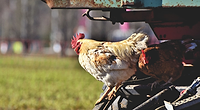Study: Food Animals Contain More Antimicrobial-Resistant Salmonella Than Previously Thought

A report from the University of Georgia (UGA) has shown that there may be more antimicrobial-resistant Salmonella in our food animals than researchers previously thought.
UGA researcher Nikki Shariat and Amy Siceloff, a first-year doctoral student in UGA's Department of Microbiology, have found that traditional culturing methods used to test livestock for problematic bacteria usually miss drug-resistant strains of Salmonella. This finding is important for treating sick food animals and the consumers who get infected by eating contaminated meat.
Antimicrobial Agents and Chemotherapy published the study, which shows that 60 percent of cattle fecal samples contained multiple strains of Salmonella that traditional testing methods missed. Interestingly, Shariat discovered that approximately one out of every ten samples tested positive for a drug-resistant strain of Salmonella, Salmonella Reading. In addition to being antibiotic-resistant, S. Reading can cause serious illness in people.
The technology used, CRISPR-SeroSeq, was developed by Shariat in 2015, and enables researchers to analyze all of the Salmonella types present in a given sample. Regular methods only examine or or two colonies of bacteria, which may potentially miss some strains of Salmonella altogether. Shariat's technology picks up molecular signatures in Salmonella's CRISPR regions, a specialized part of its DNA. It also can help scientists identify which strains of the bacteria are most prevalent.
In the aforementioned study, Shariat and colleagues found multiple Salmonella strains in cattle feces before the animals were treated with the antibiotic tetracycline. After antibiotic treatment, many of the dominant Salmonella strains in the sample were wiped out, allowing S. Reading to flourish.
Shariat's study shows that current surveillance efforts are most likely underestimating the amount of antimicrobial resistance that exists.
The U.S. Food and Drug Administration, U.S. Department of Agriculture, and U.S. Centers for Disease Control and Prevention, among others, still rely on traditional sample methods, which means they might be missing some drug-resistant bacteria. CRISPR-SeroSeq can help fill that knowledge gap, giving scientists a better idea of how much antibiotic-resistant bacteria exists. This can help livestock farmers reduce and control outbreaks and guide policy on how to fight back against a growing public health threat.
Looking for a reprint of this article?
From high-res PDFs to custom plaques, order your copy today!








